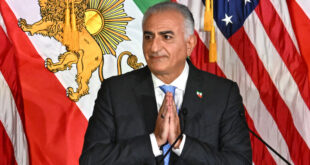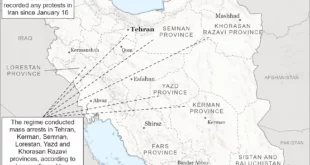 There have been lots of new beginnings for tiny Albania. In 1992, the Democratic Party of Sali Berisha swept to power in a wave of anticommunism. Optimism for fast change and willing sacrifice came with Berisha’s victory. Despite some achievements, Berisha’s government collapsed in 1997 amid the failure of catastrophic pyramid schemes and near civil war. Promising shock therapy for the economy, ordinary Albanians lamented that they received “all shock and no therapy”. The opposition Socialists won an internationally-sponsored election in 1997 and promised another new beginning. They governed until 2005. Perceived arrogance and corruption brought them down last year.
There have been lots of new beginnings for tiny Albania. In 1992, the Democratic Party of Sali Berisha swept to power in a wave of anticommunism. Optimism for fast change and willing sacrifice came with Berisha’s victory. Despite some achievements, Berisha’s government collapsed in 1997 amid the failure of catastrophic pyramid schemes and near civil war. Promising shock therapy for the economy, ordinary Albanians lamented that they received “all shock and no therapy”. The opposition Socialists won an internationally-sponsored election in 1997 and promised another new beginning. They governed until 2005. Perceived arrogance and corruption brought them down last year.
The biggest single complaint of Albanians was the pervasive corruption that meant that you had to pay someone for everything and that politicians appeared to be getting richer and richer. Albania’s corruption was hard to ignore. In 2005, Berisha ran a forward-looking campaign with slogans like “Time for Change” and “With clean hands”. The Socialists tended to look back to the bad times of 1997 — something most Albanians wanted to forget, especially since the vast majority invested and lost money in the pyramids.
Since taking office he has promised to radically change Albania. Much has already been done. His main focus is foreign investment and he hopes foreigners will see opportunities especially in tourism — a sector that is already poised for massive growth as Albania has a superb coast and tremendous natural beauty. A known workaholic, Berisha is waging a war on the country’s top-to-bottom corruption, cutting down on the size of the government and drastically lowering taxes. Albania, until now, has received limited foreign investment. Most investors have steered clear, fearing instability.
To shake things up, Berisha brought back to Albania a number of Western-trained and untainted young people to join his team. His cabinet is younger and leaner than their predecessors. As for Albania’s international image, often equated with corruption, violence, drug and people smuggling, Berisha is tackling the criminal groups. He recently moved to have the country’s chief prosecutor, Theodhori Sollaku, removed for his unwillingness to take on the country’s criminal groups. The move angered the opposition, but whether Sollaku was afraid of the criminal groups or linked to them, the result was still the same and he had to go. To eliminate endemic smuggling of people and drugs across the Adriatic Sea to Italy, the government imposed severe restrictions on boat ownership.
 He also cracked down on conflict of interests within his government, something the previous government paid little attention to. Arrests are already significant and a number of criminals previously thought untouchable are now in jail. Berisha says the battle against corruption and criminality is “going much faster than we expected with real successes”. The word on the street is that public order is improving along with more transparency from the government. It seems that all that was missing was political will from the top. International institutions concur that there is substantial progress.
He also cracked down on conflict of interests within his government, something the previous government paid little attention to. Arrests are already significant and a number of criminals previously thought untouchable are now in jail. Berisha says the battle against corruption and criminality is “going much faster than we expected with real successes”. The word on the street is that public order is improving along with more transparency from the government. It seems that all that was missing was political will from the top. International institutions concur that there is substantial progress.
However, Albanian political life remains tense and polarised. While most parties agree on the end goal — integration into NATO and the EU — they refuse to co-ordinate a strategy together. The notion of being an effective and loyal opposition has yet to take root. This is holding the country back. On the bright side, Albania finally has a Stabilisation and Association Agreement with the EU. This is an important first step in what promises to be a long and challenging road ahead to finally joining Europe.
Things are happening in Albania. In Tirana, the now growing capital of 600,000, one can hardly see the horizon for the cranes. The city’s dynamic mayor, Edi Rama, who also heads the opposition Socialist Party, has won praise for his transformation of the once dreary capital. Brightly colored buildings, renovated government offices and parks have created a whole new atmosphere.
There has also been a steady improvement in the once hopeless infrastructure. However, Albanians are tired of waiting and Berisha has to keep up the momentum. His legacy is two-fold — he was a principal figure in the toppling of Albanian communism. This time around, he told me, he wants his legacy to be Albania’s integration with NATO and the EU. Despite myriad problems, Albanians show optimism that defies the often grueling reality of poverty. Survey after survey indicates that Albanians see the future as bright — this is even after some 800,000 people have left the country seeking greener pastures elsewhere.
Albania may well have finally turned a corner after nearly 15 years of on-again-off-again transition. This is good news for a people that entered the transition from communism with the hope that by now they would have already reached their destination.
 Eurasia Press & News
Eurasia Press & News



